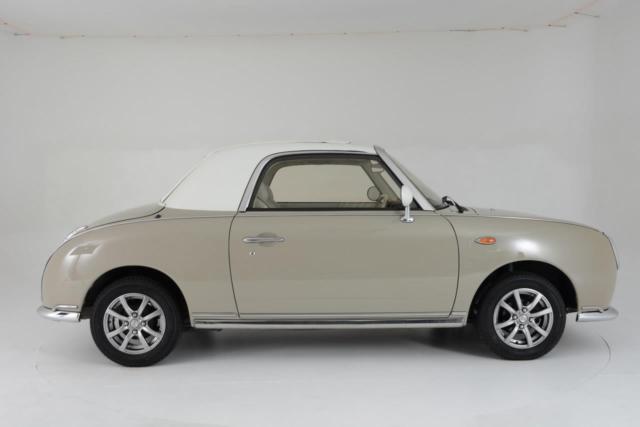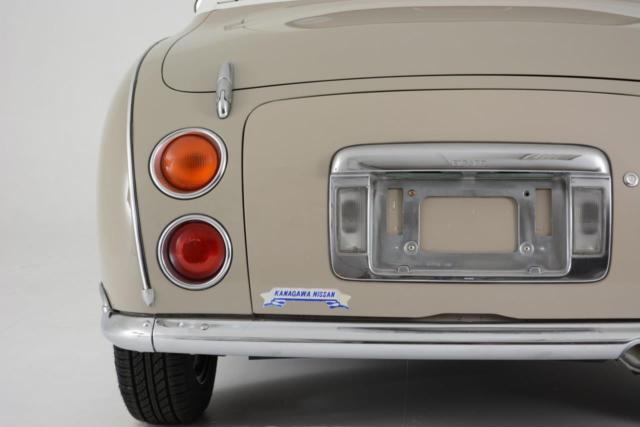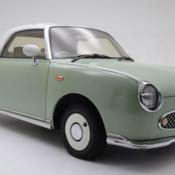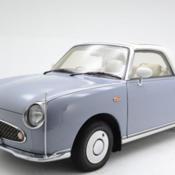1991 Nissan Figaro 42K Miles !!!
Technical specifications of Nissan Other 1991
| Price: | US $18,900.00 |
|---|---|
| Condition: | Used |
| Item location: | Philadelphia, Pennsylvania, United States |
| Make: | Nissan |
| Model: | Other |
| Type: | Convertible Coupe |
| Trim: | -- |
| Year: | 1991 |
| Mileage: | 42,400 |
| VIN: | 00000000000000000 |
| Color: | -- |
| Engine size: | 1.0 |
| Power options: | -- |
| Fuel: | Gasoline |
| Transmission: | Automatic |
| Interior color: | -- |
| Options: | -- |
| Vehicle Title: | Clear |
| You are interested? | Contact the seller! |
Description
Model History The Figaro prototype was launched at the 1989 Tokyo Motor Show under a “Back to the Future” banner as a 1950’s era throwback. In near Henry Ford fashion, just four colors were available: Topaz Mist, Emerald Green, Pale Aqua and Lapis Grey as each color symbolized a season of the year. Only 20,000 units were ever built – 8000 planned with an additional 12,000 added to meet demand. Despite the rather steep original MSRP of $14,500, they proved so... popular that Nissan held a lottery to decide who could purchase one. Designed by Shoji Takahashi and based on the Nissan March/Micra platform, the Figaro is small, like Geo Metro small, but is powered by a peppy little 987cc (1L) turbo 4-cylinder. It resembles quite closely the Autobianchi Bianchina made in Italy from 1957 – 1970. In accordance with your four color choices, you are given one transmission “option”, a 3-speed automatic and no other choices of interior. The inside is color-coded with white-faced instruments and retro-syled silver switches/knobs and a radio to match. Top Gear last year wrote “If a machine could be the manifestation of a good mood, this car would be it. You cannot look at it without smiling. It has the appeal of a puppy!” We prefer one of our reader’s description … “it’s the automotive equivalent of a little boy wearing a baseball cap, chewing gum and yo-yo’ing”. The general theme is there…having fun and always in a good mood! Today we present this 1991 Nissan Figaro showing just 68,274 kilometers (42k miles) and is a RHD fixed-profile convertible that was imported from Japan in 2017. Power is sent to the front wheels by a turbocharged 987cc inline-four mated to a 3-speed automatic transmission. A retractable soft top was standard on all Figaros, as was air conditioning, CD stereo, and leather seats. The Figaro was produced in four colors, one for each of the seasons. This example is finished in Topaz Mist (autumn), which is the rarest of the four, accounting for approximately 10% of the 20,000 Figaros produced. Described as a “retro-style 2+2,” the Figaro features a retractable fabric top with fixed-profile and two-tone bodywork. The top retracts into the concealed boot and is equipped with a glass rear window with defroster, as well as double locks and a warning buzzer for safety. Any odd smudges or shadows you might see in the images are actual reflections of the photographer’s equipment in the photo room (that should give some indication how glossy the paint is). The paint and interior are factory original. The car has never been damaged, modified (minus the wheels) and is reportedly rust free. All of the glass is reported original and shows no cracks or damage. All panel gaps appear to be properly spaced, and the chrome looks to be in great shape. The fabric rag-top is brand new, and positioned in the middle of the roof, not an actual full folding top, but rather a “fixed-profile convertible”. Think 1948 Citroën 2CV or the Fiat 500. It works without issue according to the seller, folding neatly into the rear trunk area to reveal the open centerpiece. Interior It is equipped with power steering and brakes, power windows, and air conditioning. The leather seating surfaces, nor the door sills, show any excessive wear and are what you would expect to see in a car with only 42k miles. Maintenance The Figaro has a brand new convertible top, recent timing belt service, new brakes, new tires and an oil change.

















